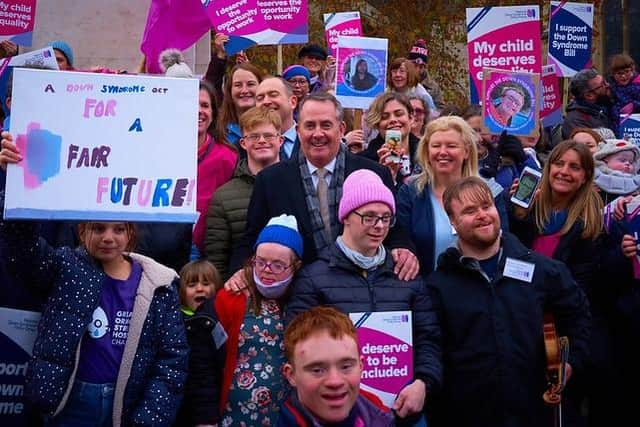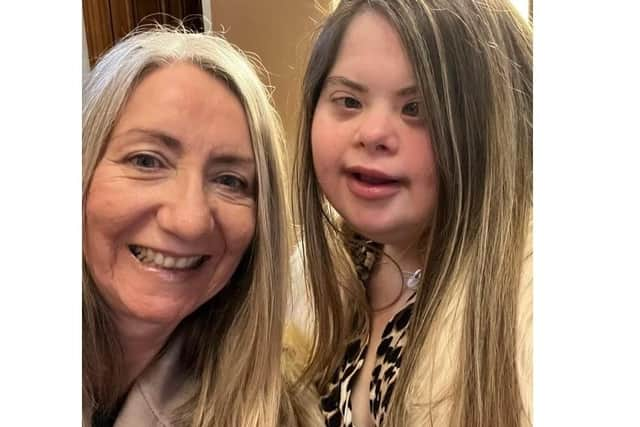Lynn Murray: As an inclusive society we should change our abortion laws to give people with Down's syndrome the right to be born


Sir Liam, a former GP and defence secretary, has tabled an amendment to the government's Criminal Justice Bill, signed by 40 MPs.
The abortion time limit in England and Wales under Section 1(1)(a) of the Abortion Act is set at 24 weeks, but for cases in which a baby is thought to have a disability, including Down’s syndrome, abortion is currently available up to birth. This amendment will equalise the time limit for babies with Down’s syndrome, meaning that it will be set at 24 weeks. In NI, new abortion laws are in many respects more liberal than in Great Britain, and a termination for Down’s syndrome can also be carried out up to birth.
Advertisement
Hide AdAdvertisement
Hide AdThe amendment has cross-party support from MPs from the Conservatives, Labour, Liberal Democrats, SNP and the DUP. This includes former Conservative Party leader Sir Iain Duncan Smith, former Liberal Democrat leader Tim Farron, former shadow chancellor of the exchequer John McDonnell, former cabinet minister Sir David Davis and former health minister Maggie Throup.


Fox's amendment will be debated and voted on as part of the Criminal Justice Bill, which is expected to return to the Commons for report stage following the Easter recess.
The most recent full-year abortion statistics, for the year ending December 31 2021, show there were 859 abortions where a baby had Down’s syndrome in 2021, an increase of 24% from 2020.
The actual numbers are probably higher than reported due to underreporting of disability abortion statistics.
Advertisement
Hide AdAdvertisement
Hide AdA 2013 review showed 886 abortions for Down’s syndrome in England and Wales in 2010 but only 482 were reported in statistics from the Department of Health and Social Care.
There has been growing momentum for a change in the law in this area after Heidi Crowter, a 28-year-old woman from Coventry who has Down’s syndrome, took a landmark case against the UK government over the disability clause in the current law. Her case has been heard in the High Court and Court of Appeal.
Heidi has been joined in her fight for justice by Máire Lea-Wilson from Brentford, West London, whose four-year-old son, Aidan, has Down’s syndrome. Máire Lea-Wilson was placed under pressure to have an abortion when a 34-week scan revealed her son had Down’s syndrome.
The UN Committee on the Rights of Persons with Disabilities has consistently criticised countries that provide for abortion in a way that distinguishes between fetuses on the basis of disability.
Advertisement
Hide AdAdvertisement
Hide AdThe Committee on the Rights of Persons with Disabilities’ concluding observations on the initial report of the UK made a key recommendation that the UK change its abortion law so that it does not single out babies with disabilities. The government has ignored this recommendation.
The Disability Rights Commission (now the Equality and Human Rights Commission) has said that this aspect of the Abortion Act “is offensive to many people; it reinforces negative stereotypes of disability…[and] is incompatible with valuing disability and non-disability equally."
The 2013 Parliamentary Inquiry into Abortion for Disability found the vast majority of those who gave evidence believed allowing abortion up to birth on the grounds of disability is discriminatory, contrary to the spirit of the Equality Act 2010.
Polling has shown that the majority of people in England, Wales and Scotland feel that disability should not be grounds for abortion at all.
Advertisement
Hide AdAdvertisement
Hide AdSir Liam Fox said: "There is considerable cross-party support to remove an anomaly in UK law which allows those with Down’s syndrome to be aborted up until 40 weeks.
"Many of us believe this is utterly against the purpose of our equality legislation and treats those with Down’s syndrome as second-class citizens when it comes to their rights.”
He said his amendment would remove an anomaly which many people “were not aware even existed”.
My daughter Rachel is 24 and has Down’s syndrome. I see every day the unique value that Rachel brings to our family. The provision in the Abortion Act harks back to a time when we thought it was better for people with disabilities not to be part of our society.
Advertisement
Hide AdAdvertisement
Hide AdWe live in a far more inclusive and progressive society now, where we celebrate diversity, and all of our laws should reflect that.
Lynn Murray is spokesperson for Don’t Screen Us Out (www.dontscreenusout.org) - a group of over 17,000 people with Down’s syndrome, their families and supporters who want a UK where people with Down’s syndrome have an equal chance of being born